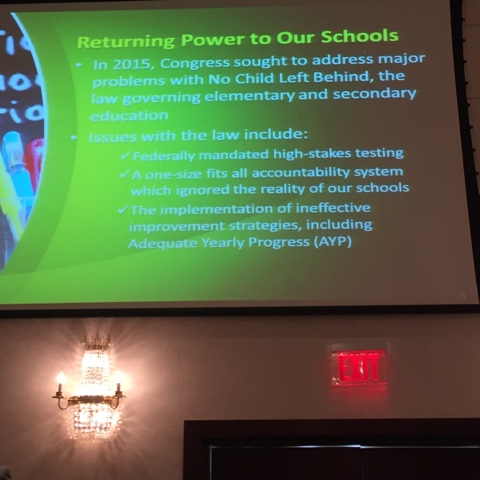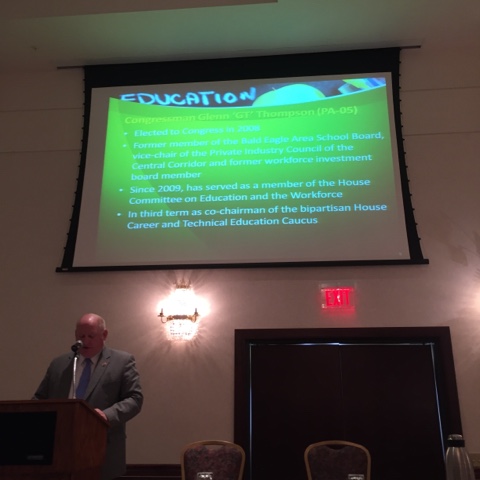Thursday, January 28, 2016
Getting 5 to agree??????
Resumption of five-party budget negotiations leaves little insight as to way forward
Author: Jason Gottesman/Wednesday, January 27, 2016/Categories: News and Views
Gov. Tom Wolf and leaders from the four legislative caucuses gathered in the governor’s office Wednesday for what seems to be a rarity these days: five-party budget negotiations.
The goal of the meeting was reportedly to find a way forward on how to finish the FY 2015-2016 budget.
While some may see it as a positive advance that the parties are sitting down together at all, Wednesday’s meeting left little in terms of real progress in finding a path forward on finishing the current fiscal year’s spending plan with both sides still at odds over what a final spend number should look like.
“I think we amplified our desire to finish the 15-16 budget, the last 13 percent, and then we can move on to fighting a lot of these battles in the next year ahead, but let’s get the final money out to the schools and the prisons and the nursing homes and we can move forward with all the other items that folks want to have on the table,” said House Majority Leader Dave Reed (R-Indiana).
The way forward, according to Rep. Reed and the House Republican caucus seems to having a final year spend plan that is around the $30.2 billion number that Gov. Wolf partially vetoed back in late December.
“I understand that’s not ideal from the governor’s perspective, but we’ll hold pension reform and liquor reform and make that part of next year’s discussion as well, but let’s just finish up this last ten percent of the budget and we’ll move on to other issues,” he said.
Legislative Democratic leadership expressed concern about moving forward in that direction, particularly given an recent report by the Independent Fiscal Office stating the Commonwealth will have a nearly $460 million deficit in the current fiscal year at those spending levels and an over $2 billion deficit for FY 2016-2017.
“The people of Pennsylvania can’t sit by and ignore that we have this structural problem, otherwise we are looking at devastating cuts going forward in the areas most important to people: education, human services, and economic development,” said Senate Minority Leader Jay Costa (D-Allegheny). “Somehow revenue has to be part of the equation, that’s a fact, I’m not making it up. These numbers tell that story.”
House Minority Leader Frank Dermody (D-Allegheny) said his caucus—and what he said was the sentiment expressed by the governor— is for a budget that adequately funds education and takes care of human services.
“Our preference is, and what I think is best for the people of Pennsylvania, public education, human services, and a deficit we have to face this year and next year, the $30.8 billion is where we ought to be on a spend number and I don’t know whether that’s achievable or not,” he said.
He said going forward, Appropriations Committee staff will be running numbers, looking at the various proposals and potential adjustments to see what can be done to get Pennsylvania to the next fiscal year.
Referencing the IFO report, he said “there’s not $2.7 billion worth of cuts in this budget.”
“We’ve got to raise revenues to solve this issue,” he said.
With the governor’s budget address slated for February 9th, both chambers of the General Assembly have recessed until February 8th.
Wednesday, January 27, 2016
PARRS
My final visit for the day
Tuesday, January 26, 2016
My journey


Iroquois meeting
Iroquois meeting
Greenville visit
And so says Andy Dinniman!!!
I know what you are thinking: deadlines didn't work then and they won't work now. That's why my legislation will also require the legislature to remain in continuous session, meeting every day without leave, without pay, without reimbursements, and without per diems, if a complete budget is not passed and signed by July 1. The same goes for the governor, his senior staff and cabinet members. That doesn't mean salary, reimbursements and per diems will be temporarily suspended and paid out after a budget plan is passed, as is currently the case. It means they'll be forfeited. It means when the legislature and the governor don't do their job and don't meet their constitutional obligations, they get nothing.
In addition, any meetings between legislative leaders and the governor after June 30 must be open to the public. The practice of playing out the budget in "he-said, she-said" leaks to the press is certainly unproductive. It has only served to further partisan gridlock and finger-pointing. If you are going to negotiate with the peoples' money and the peoples' business, do it in front of the people.
Furthermore, Pennsylvania ought to move toward biennial budgets, as is done in almost 20 other states, to reduce the uncertainty of the yearly budget process and allow more planning and financial stability for our schools and human service agencies.
Finally, let me be clear that all sides are to blame for the budget impasse. While the aforementioned changes will no doubt be beneficial, the hardest part will be changing the culture of Harrisburg.
Dragging on a budget process to (or past) the 11th hour does not mean the legislature is working hard. It means lawmakers are falling short. We may not be able to force all involved to agree, but we can create real consequences that will shake up the status quo and give the citizens budgets on time.
State Sen. Andy Dinniman is a Democrat who represents Pennsylvania's 19th Senatorial District in parts of Chester County.
What voters want!!!!
Perspective !!!!
"Madonna called education funding an issue four years in the making. Coming out of the recession, most of Pennsylvania’s 500 school districts saw budget cuts, property tax hikes or both, he said. You can debate whether that was the fault of Wolf’s predecessor, Gov. Tom Corbett, or an inevitable consequence of the end of the federal stimulus, but “the fact remains that that’s the single most important issue that voters want to see addressed,” he said."
Monday, January 25, 2016
The Rural Life
Trip to Greenville Pa
Visiting the western part of the state
Friday, January 22, 2016
North Schuylkill SD












